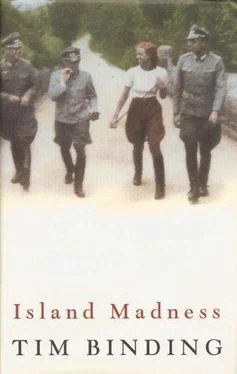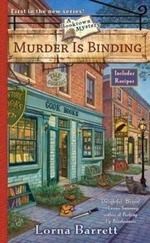“Shh,” he warned.
“Someone you know?” she teased, and breaking out of his grip she stuck her head through the leaves. Ned pulled her back again, this time more sharply.
“No one special,” he said, planting the lie on her warmth of her throat, and dragging her back against him. She stuck her feet out willingly as he hauled her back to the clearing. “An old busybody, that’s all,” he scoffed and laying her on the ground had stirred her stomach with his foot.
“I know all about busybodies,” she grinned. “There’s my aunt for a start. God, my aunt. Tries to run my life.” She scrambled up on her hands and knees and, crawling over the grass, called out, “Ahoy there, Mrs Whoever-you-are! Someone here says you’re an old…”
Ned covered her giggling mouth and turned her over.
“Be quiet now,” he said, pinning her loose arms high above her head. “It’s my mother. All right?”
“I know,” she boasted. She bounced her hips against him. “I’d like to meet her.”
“Not now,” he said, untying the belt of her jacket, conscious of their desire.
“Later, then.”
“Why? I’ve got your father to steer clear of. Now you’ve my mother. We’re evens.”
“Not really,” she told him, looking down at his insistent hands. “You couldn’t charm my father however hard you tried. But I could charm your mother as easy as pie.”
Her jacket and blouse lay open. He was barely listening.
“You could?”
“Yes. Don’t you know? I can charm anybody I want to.”
Now when he tried to form her name in front of his mother and place it alongside the other word filling his mouth, death, it was as if he were acknowledging for the first time the strength of his failed affection, the bitter ground that he had trodden upon.
“Isobel. It’s Isobel, Mum. She’s dead,” he said, stumbling over her Christian name as if he had no right to use it. “Killed.” He felt himself blushing. It was almost as if he were admitting to the deed himself.
“Isobel! Dead!” she said, echoing her son’s own exclamation. “But how!”
“That’s what they want me to find out,” he replied, walking out into the front room, indicating the Major, who stood awkwardly in the light of the doorway. He turned and lowered his voice. “I just came back to let you know I’m all right. I’ll have a quick wash while I’m here. There’s no telling how long they’ll keep me.”
Ned went upstairs. The Major, conscious of the silence and the requirements of his upbringing, took off his cap and advanced. Ned’s mother stepped into the room and faced him. In the kitchen the dog growled, and as she looked back, ready to draw attention to him as a means of conversation, she noticed the half ring of dirt on the flagstone. Ned had failed to put the basket back in its proper place. The circle of dust proclaimed their duplicity like the cheap sparkle on a brass wedding ring.
“Stop that nonsense,” she scolded quickly and shut the door. “He still hasn’t got over this morning,” she explained, adding, “You gave us all a proper fright.”
The Major bowed his stiff apology. “I did not mean to alarm you at such an hour.”
Ned’s mother sniffed. It was not the time that mattered.
“We’re all early risers here,” she told him, in a tone one might tell a stranger the nature of one’s religion.
“He has told you the news?”
“Yes. Dreadful.”
“I need his help, Mrs Luscombe.”
“I can see that.”
“I must take him away again.”
“To the house, yes.”
“You know it?”
“Dad helped build it before he passed away.” She saw the Major’s quickly masked look of incomprehension. “Ned’s father,” she explained.
“Ah.” The Major looked relieved. “He died recently.”
She nodded, wiping her hands on her dress.
“It must be hard for you,” he continued, anxious to win the battle of apologies. “Your bereavement and then us here, the two things so close together.”
“Well, you coming took my mind off Dad going, I must say.” She heard Ned moving about upstairs. “And he’d be back in England now, learning foreign ways. So I’ve got you to thank for that as well.”
Lentsch opened his hands.
“You see. Even the German army has its uses. But I must warn you. He is still learning foreign ways.” She smiled despite herself.
Ned’s clattered down the stairs. They stepped back.
“What?” Ned said, ducking into the conversation. His mother, fussing through her embarrassment, handed him his coat and shooed him out of the door.
“Mind your manners,” she reminded him softly, but he was already out on the path. The Major bowed his head and followed. She stood in the doorway, still wary, shaking her head, remembering not the blank look of sorrow she had seen on her son’s face not five minutes earlier, but that former time, in the coming of the last New Year, when Isobel had given him up, that resolution week Ned had spent drinking, long and deep, behind the closed doors of the Britannia and the rogues’ bar halfway down Hauteville, the same ill-lit, damp back room where he had thrown Veronica over, the product of another imagined slight. She had seen the weakness of the male sex in him that week, for he had done the thing that a thwarted man does, treating the world as if he was its only deserving occupant. Though he had shown an indifferent face to his mates, what a spoilt complexion surfaced when only his mother and father were present! Even at the New Year’s Eve party over at Bernie’s house, it had been Ned’s private bitterness, uttered quickly in his father’s ear, that had soured their celebratory drink, rather than the rattle sounding in Dad’s chest. “Happy New Year, son,” Dad had offered, clinking his ruby glass, a gesture to a continuity he knew to be illusory, and Ned dismissed the attempt with an impatient snort, and, grabbing Bernie by the arm, had declared that the two of them were going out to wash the bastard past away, downing whatever was in his glass, not the muiled beer on offer, but something strong and vicious, in three savage gulps before escaping to a chorus of drunken cheers. He was too busy inhaling that spiteful strength from the room to notice how Dad had flinched, conscious of the gathering speed of his mortality and the burden it placed on them all. A carpenter all his life, clever with his hands, by then he could barely climb the stairs unaided, one of the many handicaps he had tried to keep from their son, not for fear of worrying him, but in an attempt to maintain his own fragile pride. The first full day of Ned’s visit, Dad had woken to bad lungs, hawking bloody lumps into his fisted handkerchief, and as she had helped to dress him, with him sitting on the edge of the bed, an unlit roll-up stuck on his lip, panting as she pulled his trousers over his legs, the bedroom door had swung open. Across the passageway Ned sat on his bed in a cruel parody of their hidden pantomime, and for a moment the two men looked at each other. What an unwelcome mirror they both saw. Then Dad had pushed the door shut, and with his temper let loose from the slam of it, shoved her down onto the floor. From then on, during Ned’s stay, sheer bloody-mindedness had willed his body to confront tasks that had been beyond him the six months previously; carrying potatoes in from the outhouse, gathering fallen logs in the garden, even working the wet sheets through the mangle out in the yard, both of them knowing that when Ned returned to the mainland this need for exertion would pass. And so it proved, but not simply passed, for this impetuous gesture had evaporated what small reserves of energy Dad had left, and with the damp weeks of January seeping in the cold and clammy bedroom walls he took to his bed again. Yes, she would mourn the passing of Isobel, not simply for the brutality of her death, but for what it might do to her son. He had abandoned both family and faith in his careless pursuit of her and with the news he had brought back now, she feared he would never recover. Isobel would be preserved for ever, the ghost of her figure ready to rise up between him and the life he had yet to live.
Читать дальше












